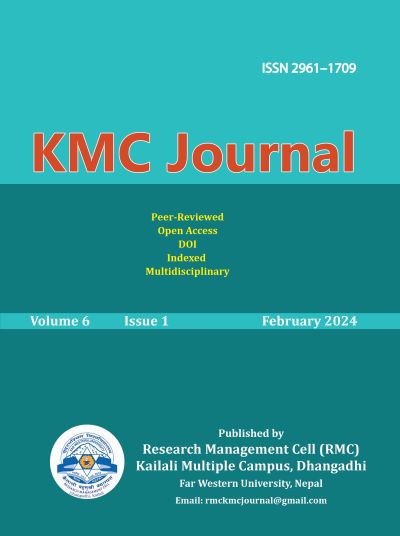Teachers’ Perceived Value of Integrating ICT in Transposing English Language Teaching in Nepal
DOI:
https://doi.org/10.3126/kmcj.v6i1.62332Keywords:
ICT integration, transformative learning, digital pedagogy, Teachers’ readiness, ELTAbstract
In the evolving landscape of English Language Teaching (ELT), the integration of Information and Communication Technology (ICT) has emerged as a fundamental pedagogical approach. This research delves into the perceptions and value attributed by teachers in Nepal towards the incorporation of ICT tools and methodologies in their teaching practices. I have used content analysis method to gather the related field of studies and analysed the data. Findings indicate that significant challenges such as limited technology access, lack of trainings, administrative support, over-load of unnecessary paper-work cause major obstacles in transposing ICT in classroom. However, ICT also offers great opportunities to transfer the traditional teaching practices, develop ICT skills, access to vast source of information and more importantly, the potential era for a paradigm shifts in the recent practices. The study emphasizes the need for a strategic approach, including investment in technology infrastructure, teacher training and supportive policy environment, to enhance ICT integration in ELT classrooms. In addition, the study provides valuable insights for policy makers, educators, researchers, and other stakeholders in their efforts to integrate ICT in teaching and learning in Nepal. Most importantly, this research contributes to the escalating discourse on ICT integration in ELT by providing nuanced insights grounded in the Nepalese context. The findings advocate for a holistic approach encompassing infrastructural development, targeted professional development initiatives, and transformative pedagogical strategies to optimize the potential benefits of ICT in transposing English language teaching practices in Nepal.
Downloads
Downloads
Published
How to Cite
Issue
Section
License

This work is licensed under a Creative Commons Attribution-NonCommercial 4.0 International License.
This license allows reusers to distribute, remix, adapt, and build upon the material in any medium or format for noncommercial purposes only, and only so long as attribution is given to the creator.




